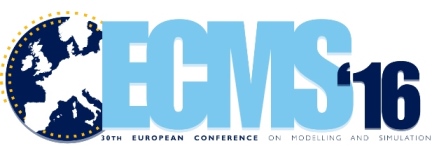
30th JUBILEE CONFERENCE
ECMS 2016
May 31st
- June 3rd, 2016
Regensburg,
Germany
Agent-Based Simulation (ABS)
© copyright OTH Regensburg

© copyright Frank Herrmann

© copyright Frank Herrmann

© copyright Frank Herrmann

© copyright Frank Herrmann

© copyright Frank Herrmann
Research in
the domain of multi-agent systems (MAS) is becoming more and more
important because of the capacity of MAS to design and simulate complex
systems, i.e. systems composed of many entities in interaction between
themselves and with an external environment. MAS are used in many domains
in which classical mathematical models are not available because either
the dynamics are far from equilibrium, or the systems are open (creation
and deletion of entities in the course of simulation), or emergent
phenomena have to be explored, or the entities are heterogeneous (for
example, the eco-socio-systems which combine ecological and social
dynamics), or simply because they provide a more intuitive understanding.
The track is intended to offer a forum for people interested in
agent-based simulation to discuss methodologies, techniques and
applications.
We encourage contributions which present not only
case studies but also critical analysis on the pertinence of multi-agent
models and their usefulness for understanding or for decision making,
design and validation methodologies, comparative studies in the modeling
sciences.
In particular, the subjects include but are not limited
to:
-
Design, implementation and validation methodologies, including participative protocols
-
Modeling languages and platforms
-
Agent architectures for different fields of simulation
-
Interaction protocols including with humans
-
Multi-level simulation and emergence of global phenomena
-
Time and space representation including multiple scales
-
Comparison with centralized models, relationship between individual-based versus aggregative models
-
Conceptual and epistemological analysis
Page
created by M.-M. Seidel
© Copyright ECMS - All Rights Reserved

